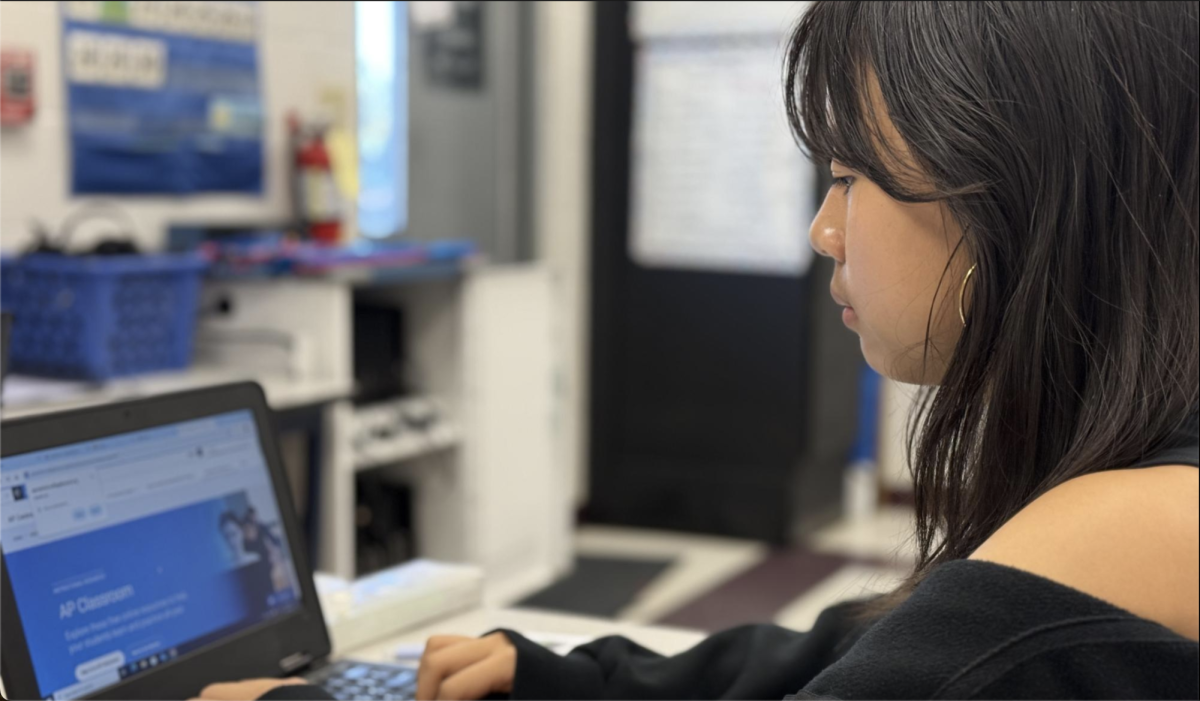
Nikita Sinha
Sophomore Tiffany Duong logs into her College Board account.
The bell rings at 3:30 pm. Instantly, hundreds of cell phones emerge from backpacks and pockets. Sighing with relief, sophomore Claudia Miranda pops her earbuds in to listen to music.
“I’m not as productive at school [since the cell phone ban began],” Miranda said. “I’m usually listening to music 24/7 — not during instruction — but any time otherwise. Now that I’m not listening to music, I get a lot less done during school hours, so it’s a lot more homework for me to do.”
On July 1, the Florida House passed a ban on “wireless communication devices” for students in grades K-8. While the bill stated that high school students could use devices such as cell phones or wireless earbuds in the classroom if given explicit permission, the Brevard County School Board elected to ban cell phone usage during all school hours (8:30 a.m. to 3:30 p.m.), including lunch time.
“The reason that the Board wrote the policy was for schools like us that have middle and high schoolers together,” Principal Buster Clark said. “If we didn’t have any junior-senior high schools, the ban may have stayed K-8, and high schools would not have [banned cell phone usage totally], but … we have classes here on this campus that have middle and high school in them together, so how do we navigate that?”
To ensure students are “focused, connected, and engaged [and] not distracted by screens,” as Superintendent Mark Rendell said at the Aug. 12 School Board meeting, legislators have been discussing an extension of the wireless communication device ban to include personal laptops and tablets.
Currently, the Brevard County policy is in a 30-day holding period, meaning the Board’s decision will be finalized and implemented starting in early to mid-September.
Clark said teachers, administrators and students are fighting the proposed extension to all personal devices.
“I’m advocating for the language to change, and I think almost all of my colleagues are advocating for that same change in language to exclude laptops,” Clark said.
A student petition with more than 13,000 signatures is circulating through Brevard students’ messages and inboxes to “support the initiative for more flexible and modernized use of personal devices in Brevard County High Schools,” as the petition dictated.
Miranda said one positive aspect of the cell phone ban is that students are talking to each other more; however, after the school WiFi was down across the county on Aug. 18, she said she worries the technological delays and setbacks will outweigh the potential social benefits.
“The increase in socialization is there [after the cell phone ban was implemented], but it is the beginning of the school year, so of course all of us [students] are going to be talking to each other,” Miranda said. “I think it’s mostly coming from the fact that a lot of us aren’t able to get our work done [due to tech and internet issues]. We’re not able to work as efficiently without that extra electronic device. Also, it feels like a lot of the conversation is people talking about the phone ban.”
Despite the uncertainty surrounding district policy, Clark said students should not worry, even if the ban’s extension passes.
“I am cautiously optimistic that we will get to a place where cooler heads will prevail and logic will come back into play,” Clark said. “Sometimes [legislators are] so hyper-focused on your position that it’s hard to let yourself see all the other factors, and that’s human nature. I think that’s what happened. [Legislators] became so passionate about getting rid of cell phones and were in a hurry to get something in place.”
Clark said he encourages students to email their School Board representative as long as they exercise “objectivity and level-headedness.”
“There needs to be some very purposeful thought and discussion around what the purpose [of banning personal laptops and tablets in addition to phones] is,” Clark said. “It’s not to take a learning tool out of your hand. It’s to keep you from being distracted. Although a laptop is not in the same boat as a cell phone.”